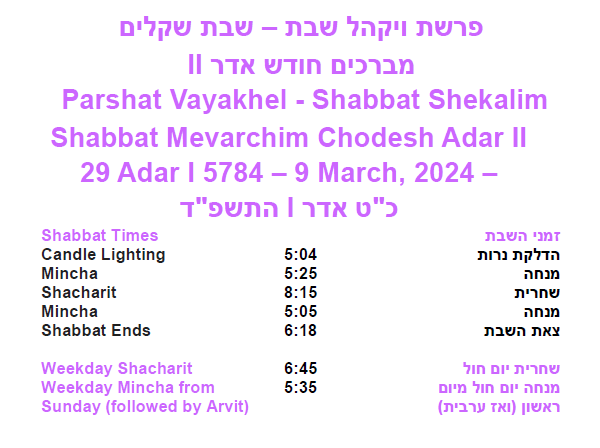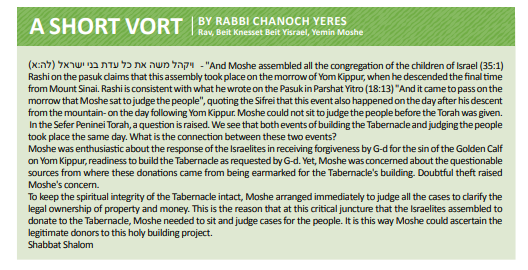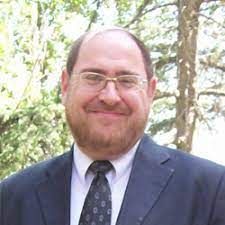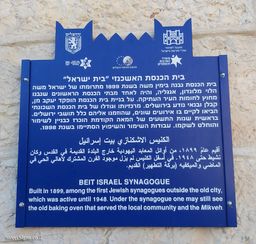Beit Yisrael Synagogue is located in the Yemin Moshe neighborhood of Jerusalem.
Beit Yisrael was dedicated in 1895 and was one of the first synagogues built outside the walls of Jerusalem's Old City.
Beit Yisrael Synagogue
2 Pele Yoetz St.
Yemin Moshe, Jerusalem
+972 52 566 6230 (Rabbi Chanoch Yeres)
Email Beit Yisrael

Dvar torah for Shabbat Parashat Vayakel/Shekalim, Shabbat Mevorchim Adar II, 5784
By Rabbi Chanoch Yeres
The opening Pasuk of this week's Parsha begins with a unique command.
"These are the things that G-d has commanded you to do them: Six days shall you work, but the Seventh day shall be holy for you, a day of complete rest for G-d." (35:1-2).
Why the need for the Pasuk to stress "you to do them"?
Also, the issue of Shabbat has already been mentioned in the Ten commandments, why the need to again repeat this warning?
The Or Hachaim (Rabbi Chaim ben Atar 1696-1743, Morocco-Jerusalem) points out that there are two issues involved here. Firstly, the Shabbat admonition precedes the instructions for the building the Mishkan. Secondly, this command of Shabbat comes on the heels of the sin of the Golden Calf.
Rabbi B. Friedman explains that the Torah warns us: "when you sin and do not do all the Mitzvot (Numbers 15:23). How is it possible for all the children of Israel to commit one sin which is equal to shunning away all its Mitzvot? One could answer that the sin of idolatry, is the sin that is considered symbolically rejecting all other Mitzvot. The solution is found in the observance of Shabbat. One day a week we arrange all our endeavors and desires to serve our Creator. Shabbat, therefore, to a certain extent, equals all other Mitzvot.
The Or Hachaim answers that now we can understand the need for the opening sentence of Shabbat at the beginning of our Parsha. The Israelites had recently sinned with the Golden Calf. To regain G-d's presence, they need to atone. Therefore, Moshe gathers the people and repeats the need to observe the Shabbat. Shabbat enables the people "to do them", to observe the rest of the Mitzvot in the Torah and allow them to grow spiritually.
This one Mitzvah of Shabbat is the only Mitzvah that proclaims to G-d, " I now dedicate myself one day a week to G-d with the intentions to dedicate my whole life to Him. For a full day, we commit ourselves to enjoy G-d's creation and appreciate His role in it.
Shabbat observance is the Mitzva that helps our people remember their uniqueness and return to the ways of G-d.
Shabbat Shalom,
Rabbi Chanoch Yeres
Rav, Beit Knesset Beit Yisrael in Yemin Moshe
Shabbat and Weekdays
Shiurim - שיעורים
* Every morning after Shacharit: Chumash with Rashi (Rabbi Yeres)
* Tuesday 8:00 pm: Gemara class in Masechet Megillah (on zoom)
* Shabbat before Shacharit @ 8:00: Parshat Hashavua (Rabbi Yeres)
* Shabbat after Kiddush: Parshat Hashavua (Rabbi Porush in Hebrew)
* Shabbat between Mincha and Maariv (Rabbi Yeres)
A Short Vort
by Rabbi Chanoch Yeres

About Beit Yisrael Synagogue
Beit Yisrael Synagogue sits opposite the walls of Jerusalem's Old City.
The breathtaking view from the Synagogue's windows inspires worshipers as no other view in the world.
It is no less inspiring within its walls, which, if they could only speak,
would relate their fascinating hundred year old story,
intertwined with that of the Jewish people's rebuilding of Zion.
The Beit Yisrael Synagogue (dedicated 1895) was one of the first synagogues built outside the Old City walls. Services continued in the synagogue after 1948, despite the exposure to enemy sniping on the edge of no-man’s land. The synagogue was renovated in 1967, and in 1975 the Jerusalem Foundation supported a critical program of repairs.
The Foundation supported creation of Beit Midrash Ephra’im, a hall for Torah study located in a former water cistern under the building’s terrace in 1981, and renovations to repair structural damage to the synagogue following a major snowstorm in 1992.
The synagogue was rededicated in 1994, following repairs to the building’s substructure, walls and roof, addition of a new kitchen, and installation of new plumbing, electrical and heating systems.
(Courtesy: The Jerusalem Foundation)
Our congregation brings together young and old, native Israelis and immigrants, singles and families, from diverse religious backgrounds. Beit Yisrael's warm, comfortable atmosphere attracts a steady stream of guests from around the world.
Come join us for a special experience.
Kiddush following services every Shabbat on the Shul's beautiful patio
overlooking the walls of the Old City of Jerusalem

About our Rabbi
Rabbi Chanoch Yeres joined our synagogue 30 years ago
and is known throughout Israel as a dynamic speaker and a warm individual.
He always has a welcoming smile and kind word for members and guests alike.
Rabbi Yeres is married to Rebbetzin Esti and they have 5 children and 1 grandson.
We need your consent to load the translations
We use a third-party service to translate the website content that may collect data about your activity. Please review the details and accept the service to view the translations.
